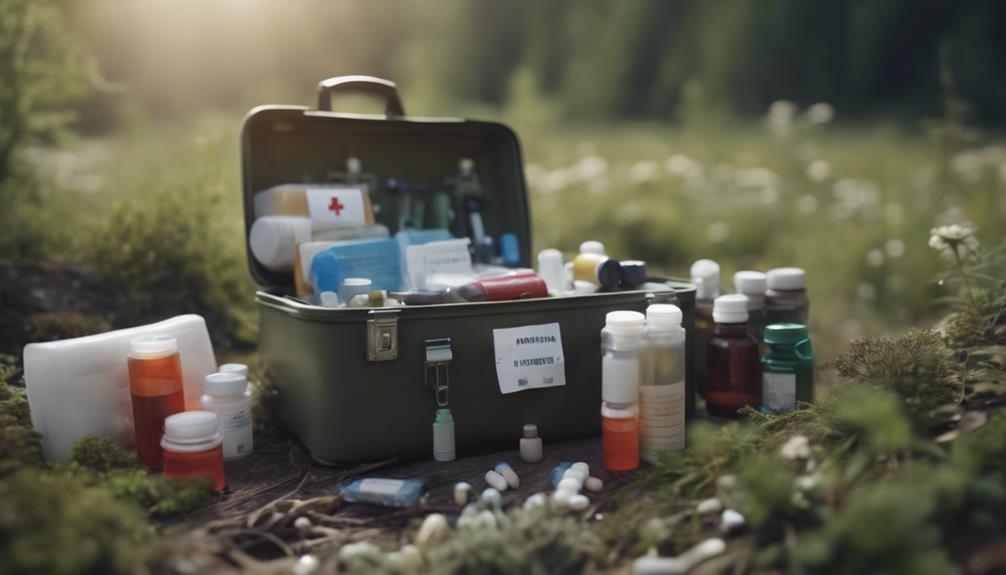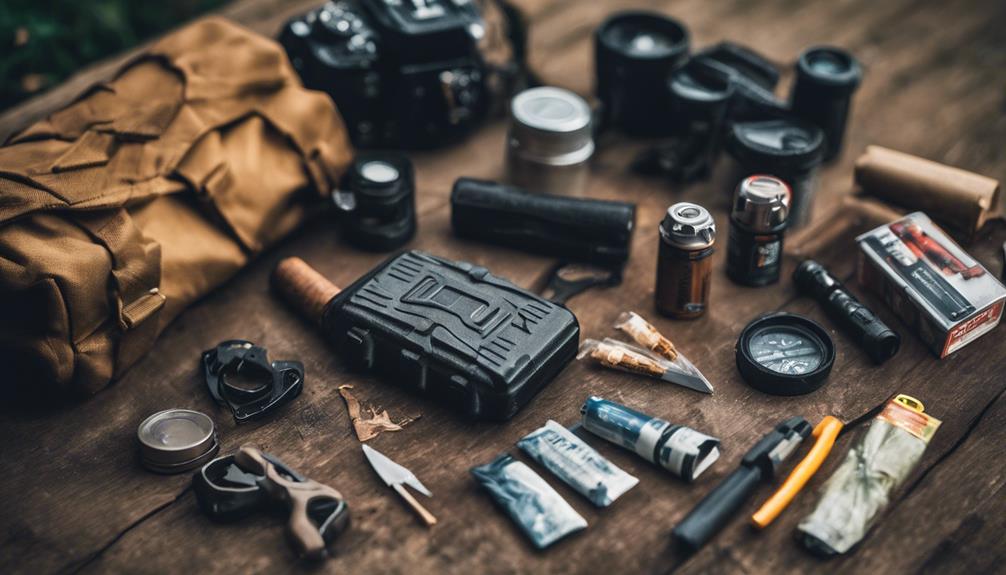FINAL<|start_header_id|>
Key Takeaways
- Obtain antibiotics legally from reputable sources like Jace Medical, ensuring quality control and accurate dosages for emergency preparedness.
- Consult healthcare professionals for guidance on proper antibiotic usage and prioritize pharmacy-sourced human antibiotics for survival kits.
- Avoid using fish or veterinary antibiotics for human consumption to prevent antibiotic resistance and health complications.
- Store antibiotics properly in airtight containers, away from direct sunlight, to maintain potency and extend expiration dates.
- Consider natural antibiotic alternatives like honey, garlic, and probiotics as valuable additions to a survival kit, but not as replacements for medical-grade antibiotics.
Antibiotics in a Survival Kit
Stock your survival kit with antibiotics like amoxicillin and azithrom, which can be found in kits from providers like JACE Medical.
Remember to always consult a healthcare professional before using antibiotics and follow proper dosage instructions to ensure safety and effectiveness.
Additionally, make sure to regularly check the expiration dates of antibiotics in your survival kit and replace them as needed to maintain their potency.
Legal Ways to Obtain Antibiotics

You can legally obtain antibiotics for emergency preparedness by purchasing antibiotic kits from reputable sources like Jace Medical. These kits contain pharmacy-sourced antibiotics prescribed by licensed US physicians for emergency preparedness. By acquiring antibiotics through proper channels, you guarantee quality control, accurate dosages, and responsible use. A consultation with a physician is even included in the purchase of these antibiotic kits, so you'll have guidance on usage.
Here are some key benefits of obtaining antibiotics legally:
- Quality control: Make sure you're getting high-quality antibiotics that are safe to use.
- Accurate dosages: Get the right dosage for your specific needs, avoiding under or overmedication.
- Responsible use: Learn how to use antibiotics responsibly, reducing the risk of antibiotic resistance.
- Physician guidance: Get expert advice on when and how to use your antibiotics, taking care of yourself and your loved ones in emergency situations.
A lot of people may not know that it's possible to legally obtain antibiotics for emergency preparedness. By taking the right steps, you can take care of yourself and your family in times of need.
Fish Antibiotics for Humans

While it may be tempting to turn to fish antibiotics as a substitute for human antibiotics, they aren't an essential or reliable option for human consumption. These antibiotics aren't FDA-approved for human use and may not meet safety and quality standards.
The dosages and purity of fish antibiotics can vary, leading to potential health risks if consumed by humans. Using fish antibiotics can be dangerous and ineffective, as they may not target the specific bacterial infection you're dealing with. You might end up taking the wrong antibiotic, which can lead to antibiotic resistance or even worsen your condition.
It's important to consult a healthcare professional and obtain antibiotics from reputable sources for human use. Don't risk your health by relying on fish antibiotics. Instead, consider emergency kits from trusted providers like Jace Medical, which offer pharmacy-sourced antibiotics for safe and proper human consumption. Your health is too important to gamble with unapproved alternatives.
Veterinary Antibiotics for Preppers

As you consider veterinary antibiotics for emergency preparedness, you're likely wondering if they're a viable option. You'll need to weigh the pros and cons, including the differences between veterinary and human use, to make an informed decision.
In the following sections, we'll explore the legitimacy of veterinary antibiotics, key differences between veterinary and human use, and essential safety and storage tips.
Fish Antibiotics Legit?
Fish antibiotics, marketed as a convenient solution for preppers, raise serious concerns about safety and efficacy when used for human consumption. You might be tempted to stock up on these antibiotics, thinking they'll be a quick fix in an emergency. But, it's vital to understand the risks involved.
Here are some important facts to keep in mind:
- Fish antibiotics aren't approved for human use by the FDA and may not meet quality standards for human consumption.
- Using veterinary antibiotics intended for fish can be risky due to inaccurate dosages and potential contaminants.
- The FDA warns against using animal antibiotics for humans due to safety and effectiveness concerns.
- Reliable sources like Jace Medical offer pharmacy-sourced antibiotics specifically for human use in emergencies.
Veterinary Vs Human Use
You're likely wondering why veterinary antibiotics, even those marketed for preppers, shouldn't be your go-to solution for emergency preparedness. The truth is, veterinary antibiotics are not intended for human use and may contain different additives and dosages than human antibiotics. This can lead to incorrect dosing, ineffective treatment, or even harmful side effects if used without proper guidance.
| Veterinary Antibiotics | Human Antibiotics |
|---|---|
| Not intended for human use | Specifically designed for human use |
| May contain different additives and dosages | Regulated for safety and efficacy |
| Can lead to incorrect dosing or side effects | Ensure proper treatment of bacterial infections |
Prioritizing pharmacy-sourced human antibiotics for your emergency preparedness kit is important. Human antibiotics are regulated for safety and efficacy, ensuring proper treatment of bacterial infections in humans. It's vital to consult with a licensed physician or healthcare provider to guarantee the proper use of human antibiotics for prepping purposes. Don't risk your health by relying on veterinary antibiotics; instead, focus on obtaining the right antibiotics for your emergency preparedness needs.
Safety and Storage Tips
When storing veterinary antibiotics for emergency preparedness, prioritize a cool, dry, and dark location to extend their shelf life. You should avoid storing them in areas prone to moisture, direct sunlight, or extreme temperatures, as these conditions can cause the antibiotics to degrade or lose potency. Proper storage is vital to make sure the antibiotics remain effective when you need them most.
Here are some essential safety and storage tips to keep in mind:
- Keep antibiotics away from children and pets to avoid accidental ingestion or exposure.
- Label and date the storage container to ensure you can easily identify the contents and expiration dates.
- Store antibiotics in their original packaging to maintain their integrity and protect them from contamination.
- Check expiration dates regularly and replace expired antibiotics to guarantee their effectiveness in an emergency.
Antibiotic Expiration Dates Matter

As you stockpile antibiotics, you'll need to take into account their shelf life.
You should know that proper storage can greatly impact the potency of your antibiotics, and it's essential to understand how expiration dates affect their effectiveness.
Shelf Life Concerns
Properly storing your antibiotics in a cool, dry, dark place can greatly extend their shelf life, making them remain effective well beyond their expiration dates.
You might be wondering, what's the big deal about expiration dates anyway? The truth is, the expiration date on antibiotics is more about potency loss than safety concerns. This means that even if your antibiotics have expired, they might still be effective, but their potency might've decreased.
Here are some key takeaways to keep in mind:
- Properly stored antibiotics can remain effective past their expiration dates, as shown in military studies.
- Extending the shelf life of antibiotics involves ideal storage conditions of cool, dry, dark places.
- Monitoring the effectiveness of expired antibiotics through testing can reassure their usability.
- Understanding the nuances of antibiotic expiration dates can aid preppers in optimizing their emergency supplies.
Storage Impact
By controlling the storage environment, you can significantly slow down the degradation of antibiotics, making their expiration dates more of a guideline than a hard deadline. Proper storage in cool, dry, dark places can extend the shelf life of antibiotics. This is important because expiration dates indicate when they may start to degrade in quality and potency. Following storage guidelines can guarantee that antibiotics remain viable for longer periods.
Military studies have shown that drug expiration dates can be safely extended under certain conditions. This is particularly significant for preppers, as access to medical supplies may be limited during emergency situations. By storing antibiotics away from moisture, heat, and light, you can maintain their effectiveness.
It's crucial to keep them in airtight containers, protected from environmental factors that can cause degradation. By taking these precautions, you can ensure that your antibiotics remain a reliable resource when you need them most.
Storing Antibiotics for Long-Term

You'll greatly extend the shelf life of your antibiotics by storing them in cool, dry, dark places. This is important for maintaining their potency and guaranteeing they remain effective when you need them. Military studies have shown that proper storage practices can safely extend drug expiration dates, making it essential to get it right.
Here are some key storage tips to keep in mind:
- Avoid humid or warm environments: These conditions can cause antibiotics to deteriorate and lose their efficacy.
- Keep them away from direct sunlight: Direct sunlight can also cause antibiotics to break down and become less effective.
- Store them in airtight containers: This will help keep moisture and air out, preventing degradation.
- Check expiration dates regularly: Even with proper storage, antibiotics do have expiration dates. Regularly check your supply to ensure you're not holding onto expired medications.
Alternatives to Antibiotics in Survival

When disaster strikes, turning to natural alternatives can be a lifesaver.
Natural Antibiotic Options Exist

You can turn to natural antibiotic options like honey, garlic, and oregano oil, which have been found to provide antibacterial benefits in a pinch. These alternatives can be a lifesaver when traditional antibiotics aren't available.
Some natural remedies that have shown promise include:
- Tea tree oil, which has antimicrobial properties
- Colloidal silver, which has been found to have antibacterial effects
- Echinacea and goldenseal, plant-based antibiotics that may help boost your immune system
- Manuka honey, which has potent antibacterial properties and is often used in wound care
Additionally, probiotics like lactobacillus and bifidobacterium can support gut health and potentially enhance immune function.
While these natural options shouldn't replace medical-grade antibiotics, they can be a valuable addition to your survival kit. It's important to remember that natural antibiotics may not be as potent as prescription antibiotics, so it's vital to use them wisely and in conjunction with other survival strategies.
Safe Antibiotic Use Without Doctor

To guarantee safe and effective antibiotic use without a doctor, follow the guidelines outlined in the antibiotic kit.
Consult a healthcare professional for personalized guidance.
Frequently Asked Questions
What Is the Best All-Around Antibiotic?
You're wondering what the best all-around antibiotic is? Well, you're in luck! Experts agree that doxycycline is the top choice, effectively fighting a wide range of bacterial infections, from respiratory to skin and tick-borne illnesses.
How Can I Get Antibiotics?
You're wondering how to get antibiotics for emergency preparedness? You can actually obtain them from reputable sources like Jace Medical, which offers kits with essential meds and a licensed physician consultation.
How Much Does a Jace Case Cost?
You're wondering how much a Jace Case costs? It's $259, covering quality antibiotics like amoxicillin and azithromycin, plus access to licensed US physicians for consultation, giving you peace of mind and security in emergency situations.
What Over the Counter Antibiotics Can I Buy?
You're wisely stocking up on meds! For minor cuts and skin infections, you can grab Neosporin, Bacitracin, and Polysporin over-the-counter – perfect for basic first aid needs in emergency situations, without needing a prescription.
Conclusion
As you prepare for the unexpected, remember that storing antibiotics is like holding a precious gem – it's valuable, but fragile. Mishandle it, and it loses its potency. Proper storage conditions are crucial—antibiotics should be kept in a cool, dry place to preserve their effectiveness. In addition to antibiotics, it’s worth exploring natural remedies, as sugardine healing benefits have been noted for their ability to enhance wound healing and prevent infection. A balanced approach combining modern medicine with natural alternatives ensures you’re well-prepared for various situations.
By understanding legal ways to obtain antibiotics, proper storage, and natural alternatives, you'll be better equipped to face medical emergencies.
Stay informed, stay prepared, and you'll be the calm in the storm, ready to face whatever comes your way.










